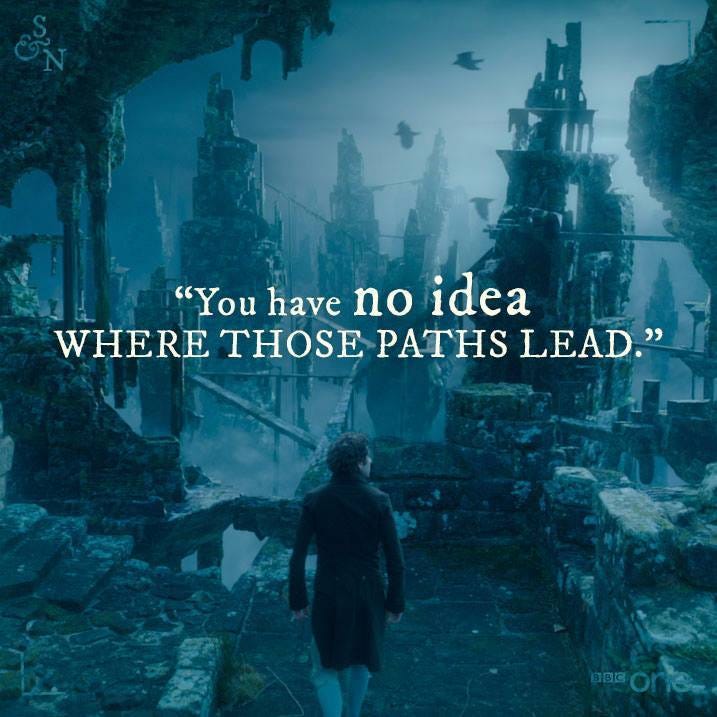The revival of magic
Summoning spirits is one thing, controlling them is another
It’s such a rare triumph for me to finish a book these days, when my attention is addled by too much X, that I feel I should celebrate the triumph with a blog post.
The book in question is Mr Norrell and Jonathan Strange. Published in 2004 by Susanna Clarke, it’s a novel about two magicians who try to bring back magic to Britain in 1800s, 300 years after it has disappeared.
Back in the Renaissance, magic was at the centre of the rising British empire. Indeed the first person to use the phrase ‘British empire’ was John Dee, pictured above, who was court magician to Queen Elizabeth I.
That’s magic for you – if you can control people’s imaginations with a word or an image, you can change the course of history.
Meanwhile, the greatest playwright of the Elizabethan age (or any age) was William Shakespeare, whose plays are soaked in magic – witches, fairies, spells, incantations, with barely a mention of Christianity.
That was the old England, merrie England, fairie England.
In the 17th century, magic just about managed to survive alongside the rise of experimental natural science (Isaac Newton, for example, was into both), but by the mid-18th-century, magic had been pushed out of the mainstream of the British Enlightenment.
Rational, commercial, respectable, practical Britain had no time for fairies. Converse with spirits became disreputable, embarrassing, even lunatic, something that only old eccentrics, old women and primitive peoples dabbled in.
Magic in the Victorian age was largely confined to the nursery room. English children’s books bulged with outcast fairies, witchcraft and talking animals – think of Lord of the Rings, the Narnia books, Peter Pan, Mary Poppins, The Secret Garden, Harry Potter, the BFG, His Dark Materials. English magic lived on but as a fairy tale.
Mr Norrell and Jonathan Strange is an alternative history. In 1800, or thereabouts, a Yorkshire magician called Mr Norrell manages to revive magic and make it respectable and useful to Britain during the Napoleonic Wars. Norrell takes on a student, Jonathan Strange, who even goes to fight in the Wars, becoming Merlin to the Duke of Wellington.
Norell and Strange become celebrated and wealthy figures, feted by high society, consulted by the government. Yet at the heart of this great revival of English magic there is a lie, a cover up, a dirty secret.
Norrell rises to national prominence because he brings back the wife of a minister from the dead. He does this through a Faustian pact with a fairy, who offers him a bargain. The fairy will bring the minister’s wife back from the dead, but only if she then spends half her life living with the fairy in his kingdom. Mr Norrell agrees.
But the fairy is a trickster, and it turns out the poor lady must spend every night with the fairy, dancing in endless balls in his fairy castle. She wakes up every day back in England, exhausted, dissociated, wishing she were dead. But she can’t tell anyone what has happened to her, and Norrell’s secret deal remains hidden.
I won’t give away any more of the plot, but the novel explores whether it’s really possible to make magic respectable and safe, considering that it often involves contracts with fairies or spirits, and they have different moralities to us – they’re not demonic, precisely, but they certainly don’t follow human morality and they don’t much care if humans suffer or die.
The novel imagines a re-enchanted England, but ‘enchantment’ isn’t necessarily a positive word in the novel. It can mean someone is trapped in a spell, like the unfortunate wife trapped in fairie.
In another novel by Susanna Clarke, Piranesi (2020), a man becomes entrapped and enslaved in a magical labyrinth cast by another magician, to the extent he has completely forgotten his identity. This is predatory magic, and it is a real thing.
Now, perhaps it’s just because at this present moment I am obsessed with the psychedelic renaissance, but when I read Norell and Strange, I couldn’t help but see it as an allegory for the psychedelic industry.
For what is the psychedelic renaissance, if not an attempt to revive magic in boring, disenchanted, secular, capitalist society?
Aldous Huxley tried to pretend that psychedelics were reviving mysticism, and the first paper by the Johns Hopkins team talked of psilocybin giving us mystical-type experiences. But let’s be honest, it’s not a mystical revival, it’s a magical revival.
No mystic ever clicked their fingers and said ‘heavens, open to me now!’ The mystic slowly surrenders their will to God and purifies their inner life, in the hope that one day God might deign to meet them. The magician, by contrast, simply prepares a tincture and announces ‘My Will be done!’ And presto, the heavens open on their command.
And that is precisely what Aldous Huxley did in 1953 when he took mescalin. He ‘took the Kingdom of Heaven by violence’, to use one of his own phrases.
Huxley was friends with the astronomer Edwin Hubble in Los Angeles, and Edwin’s wife Grace once commented: ‘Aldous and Gerald [Heard] seem to me, in this pursuit of religion, like two small boys working over a conjurer’s box of parlour tricks…they are looking for magic and power, for the secret words, the open sesame that rolls back the door. It is not religion, it is magic.’
Spot on Grace! Aldous was looking for a technique of power that could give him a ‘mystical experience’ whenever and wherever he wanted it. He just called it mysticism to make it more reputable.
He wasn’t the only one who turned to psychedelics for magical power…
After the paywall, the magickal underpinnings of the psychedelic renaissance. Can Doblin et al make psychedelic magic respectable?




